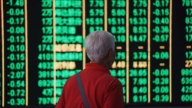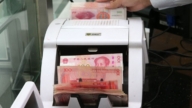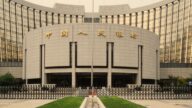【新唐人2013年06月17日訊】中共審計署公布了36個地方政府的債務餘額,超過3.8萬億元,美國信用評級公司——「穆迪公司」推算,從2010年末至2012年末,兩年內,中國地方政府的債務可能已經上升到12萬1千億。然而,目前各級地方政府還在積極上馬大型項目,而地方政府的財政收入主要來源於賣地,隨著賣地機會越來越少,這些不斷增長的債務怎樣償還?為甚麼銀行還在不斷給它貸款?中共中央政府摸清地方政府的驚人債務後,有無勇氣讓地方政府倒閉?中國經濟面臨甚麼後果,我們一起來聽聽專家的分析。
美國著名的三大信用評級公司之一——「穆迪公司」日前表示,根據中共審計署公布的數字推算,從2010年末至2012年末,中國地方政府直接和擔保債務可能已經上升了13%,達到12萬1千億。
另據美國《華爾街日報》報導,中國各級地方政府還在積極上馬大型項目。到目前為止,共有16個省和2個直轄市政府發佈了公告,宣稱投資項目對於推動經濟增長的重要性,並敦促下級政府盡一切可能加速推進未來幾個月的資本項目。這些省市的經濟規模大約佔到中國國內生產總值(GDP)的60%以上。
美國南卡羅萊納大學艾肯商學院教授謝田: 「這些東西跟它的腐敗,跟它的一些濫權都是連在一起的,它也沒辦法真正去遏制,如果真正遏制的話,下面說,那我都不建了,我們GDP一下倒退,上面可能也受不了,現在處於一種利益集團上下互相勾結,也互相箝制,互相對立、對峙這麼一個狀態。」
從債務資金來源看,36個地方本級政府2012年底債務餘額中,銀行貸款和發行債券分別佔78.07%和12.06%。
謝田:「中國的司法不獨立,銀行也不獨立,中央銀行也不獨立,地方官員有權利、有能力去控制各地的銀行,他依賴銀行貸款,對於銀行來說,如果不讓它貸款,他們也沒有地方去賺來他的利潤。」
謝田還指出,很多的貸款與前期的房地產投資有關,如果不再繼續貸款給當地政府,以前的投資就會泡湯。
審計署財政審計司負責人答記者問時,說審計的目地是要「摸清地方政府性債務增長變化情況,揭示債務管理中出現的新情況、新問題和風險隱患。」
而中國的爛尾工程、半癱子工程、重復建設,金融體系已經幾近拖垮中國經濟,謝田曾指出,中國地方政府破產或有助於改善中國經濟,不過中共不會允許地方政府破產。
謝田:「中共處於維穩和維持政權、維護所謂局勢的角度出發,它不會允許這些項目破產,也不會允許銀行破產,它沒辦法只好繼續追加投資,繼續撥款,繼續印鈔票,他也知道繼續印鈔票的結果,最後導致通貨膨脹不可收拾,民怨沸騰的話中共也會垮臺,那畢竟可能是以後的(事),對他來說度過眼前的難關才是最重要的。」
不過,北京《國情內參》期刊的首席研究員鞏勝利認為,中共7級的政府構架中,還有大量的隱形經濟和債務沒有暴露出來。
北京《國情內參》首席研究員鞏勝利:「公布的這個數據有沒有水分,這個很值得疑問的,在中國政府之上有一個中國共產黨,共產黨的財政預算從來都沒有公開過,這一部分隱形的債務不知道有多大,審計署還沒有權利審計黨的機構,如果書記市長腐敗突然爆發,中國債務真的控制得了?所以我提醒媒介,關注這個比它的表面數字更有意義。」
謝田表示,中共的高層已經意識到巨大的地方債務,而企圖收緊銀根,但是地方政府只考慮自己在位時的業績,和從新的項目中撈取好處。因此顯示出﹕中共高層對中國經濟的不可控制性。
採訪/林莉 編輯/劉惠 後製/李智遠
12-Trillion-Yuan Local Debts: Chinaj’s Economy Out Of Control
China’s National Audit Office (NAO) data shows that 36 local
governments’ debts have reached over 3.85 trillion yuan.
Leading US credit rating agency, Moody’s, warns that
by the end of 2012,
China’s local government debts might have
increased to 12.1 trillion yuan.
However, local Chinese Communist Party authorities
are still boosting large-scale construction projects locally.
It is known that land sales have been
a major part of local fiscal revenues.
As land-sale opportunities shrink, how will these
increasing debts be paid off in the future?
Why have bank loans continued with these local projects?
Is it possible that the CCP central authorities will allow
local authorities to go bankrupt?
What’s the economic aftermath facing China in
the near future? Let’s see what experts are saying.
Moody’s recently said that based on the NAO report data,
from the end of 2010 to the end of 2012,
China’s local government debts may have risen
by 13%, up to 12.1 trillion yuan.
The Wall Street Journal reported that large-scale
investment projects are still locally promoted.
So far, 16 provincial-level authorities have declared
“the importance of investment projects in driving growth".
They have urged “lower levels of government to
accelerate implementation of plans in the months ahead."
Reportedly, these provinces and municipalities represent
over 60% of China’s GDP.
(Prof. Univ. of South Carolina-Aiken) Xie Tian:
“These debts are linked to CCP officialdom’s corruption and power abuse.
The CCP has no way to truly curb it.
If it really intends to prevent it, all its local authorities would
react by ceasing activity that allows corruption to continue.
The result would be big setback in GDP,
That is something that CCP central could not bear.
Currently, inside the CCP, there exist collusion, and
stand – offs between top-level and local interest groups."
By the end of 2012, among the debt balances of
the 36 local authorities, bank loans were over 78%,
and bond issuance was over 12%.
Xie Tian: “China has no independent judiciary, nor
has it any independent banks, only its own central bank.
Local CCP leaders have authority to control local banks,
so they rely on bank loans.
The banks won’t reject local governments, for they have
no other sources for earning more profits."
Xie Tian points out that a great many bank loans
were invested in real estate in the past.
To stop bank loans to local governments would
be to risk previous investment for naught.
In replying to a reporter, a Public Finance Audit chief has
said that the audit goal is to “find out how
local governments’ debts have increased.”
Also, the audit serves to “reveal the new situation, new
problems, and potential risks in terms of debt management."
So far, China’s financial system has been seriously
affected by unfinished construction projects,
and redundant constructions.
Xie Tia says that local government bankruptcy may
help to improve China’s economy.
However, CCP authorities won’t allow this to
happen in practice, says Xie.
Xie Tian: “In order to keep its political rule, the CCP
won’t allow its local authorities and banks to go bankrupt.
It has no other options but to allocate more funds,
and to print more money.
The CCP knows well that printing more money
will make inflation run out of control.
It also knows that seething public discontent will
cause the CCP’s collapse, but it’ll happen later on anyway.
The CCP’s most important issue is how to get through
despite difficulties at the moment."
Gong Shengli, a think-tank senior researcher in Beijing,
believes that a massive invisible economy and rising
local debts in China remain unexposed.
Gong Shengli: “The released figure is questionable.
In China, the CCP overrides the government.
The CCP’s financial budget has never been made public.
We don’t know how much this is part of invisible debts.
The NAO has no authority yet to
audit the Party’s organizations.
With the exposures of the corruption of Party chiefs
and mayors, will those local debts still remain controllable?
So I’d like to remind the media that paying attention to
these facts makes more sense than accepting official figures."
Xie Tian says that the CCP central authority has realized
the existence of a huge burden of local debts.
Thus it has tried to tighten the money supply.
Whilst local authorities only consider their own performance,
which is proved by the state of local economies.
Also, local leaders and officials only focus on their own
personal gains, pocketed from new investment projects.
Xie Tian concludes that the CCP central authorities
have lost control of China’s economy.























